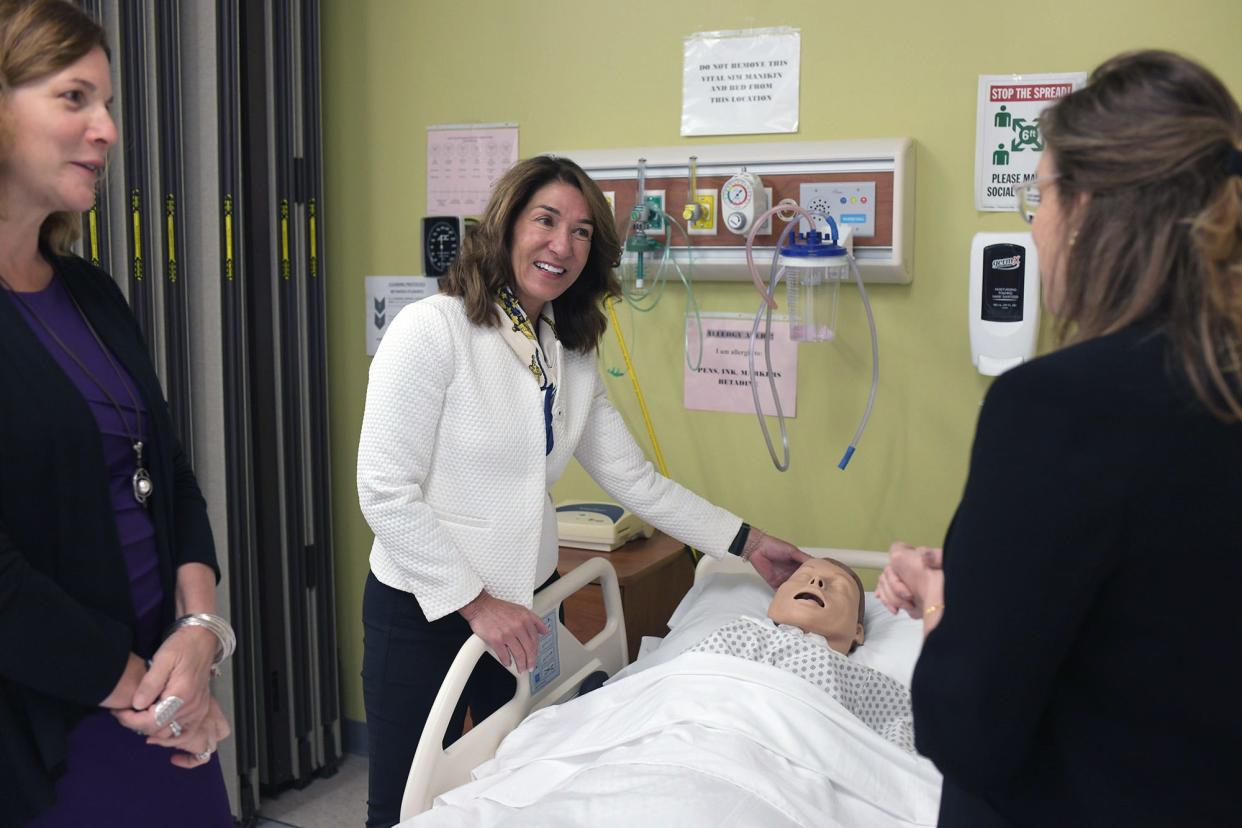QCC gets $500K to close workforce shortage with unemployed, underemployed

WORCESTER — A $500,000 grant to Quinsigamond Community College will be used to train 72 people to become biotechnology technicians.
Speaking at the college's Healthcare and Workforce Development Center on Federal Street, Lt. Gov. Karyn Polito announced the latest round of the Sen. Kenneth J. Donnelly Workforce Success grants, which divides $2 million equally between four institutions including QCC.
"The students that are graduating from these incredible colleges and universities right here in Central Massachusetts are going on to incubate their ideas into employers," Polito said. "Every single one of them knows that the way they can drive future growth in their workplace is to have people with the talent and skills to do the jobs."
The grants are part of an ongoing effort by the Baker Administration to close the workforce shortage by awarding funding to sector-based employment programs that not only provide job training, but also job placement and retention services to unemployed and underemployed Massachusetts residents.
In March of this year, $5.4 million was divided among 12 organizations throughout the commonwealth including the Polus Center for Social and Economic Development in Gardner that received $500,000.
"We need smart people with PhDs just as much as we also need technicians and people with credentials graduating from programs like this," Polito said.
Action for Boston Community Development, Berkshire County Regional Employment Board and Holyoke Community College were the other recipients of the grant to help train and place hundreds of people for jobs in other sectors.
For QCC, the grant will be used to expand professional training and certificate programs in biotech and provide funding to people who choose to enroll in these programs, said Luis Pedraja, president of the college.
"We have certificate programs that train people on some of the soft skills that they need, plus the language of the field of biotech and some lab work," he said. "Then they also get to meet and have lectures from some of our partners in the industry."
He said these partnerships help get students into the job market more quickly.
"Our first program we had about half of the students who easily got jobs with AbbVie and other companies in the region," Pedraja said.
QCC was a previous recipient of the grant in 2021, when it was awarded $197,183. That funding helped the unemployed to take part in the College’s Administrative Medical Professional Program.
"Education is at the heart of any type of economic growth and we, as community colleges, do the bulk of all the workforce education in the state," Pedraja said. "We are partnering within the industry to make sure that they have the people that they need to meet the needs of the future."
Expanding apprenticeships
Labor and Workforce Development Sec. Rosalin Acosta also spoke at the news conference, highlighting the importance of not only expanding into biotech but also expanding apprenticeships.
"Apprenticeship programs are ... the great equalizer," Acosta said. "To have the opportunity to learn and earn money at the same time creates loyalty with that employee, creates a sense of ownership in that company and creates a sense of real loyalty because you feel the employer is really investing in you."
Acosta spoke of the inequities in the workforce which, she said, were exacerbated during the COVID-19 pandemic, particularly for food and retail service workers.
"These are folks that, some of them are still on the sidelines, some of them don't want to go back to those jobs because some of them feel like those hours are not what they want anymore or they're looking for better pay," Acosta said. "They are looking for a transition. Health care is a beautiful transition because it's very service oriented."
Acosta said that it is predicted that over 40,000 health care jobs would be open in, "the next few years" and that programs such as these will help fill those jobs.
She said that the unemployment rate in the state has improved from over 17% in April 2020, to about 3.9% currently. However, the unemployment rate for Latinos is 7.8% and 6.4% for Black people.
"We still have some work to do," Acosta said. "We are on our path to a resilient recovery. What we just have to make sure is in that path to recovery, that we're giving equal access to all."
Pedraja said that he thinks that Central Massachusetts will be able to become a hub for biotechnology, not just for the state but "in the world.
"This will really help us grow the workforce that is needed in this region, particularly with biomanufacturing," Pedraja. "It's been a great partnership with the industry, with the state and the educational facilities."
This article originally appeared on Telegram & Gazette: Closing workforce shortage: Quinsigamond Community College gets $500K to train, place unemployed, underemployed

